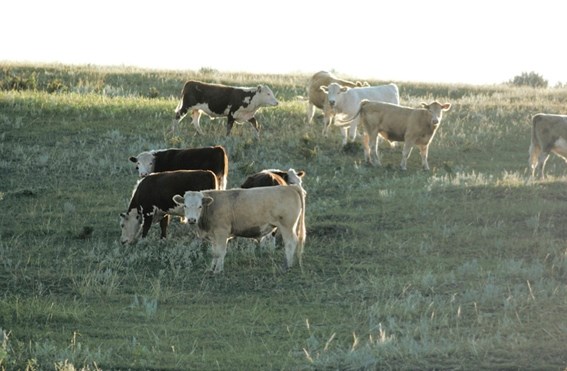A barn full of local beef producers unanimously supported the provincial plan to increase cattle service charges in hopes of allowing the industry to remain competitive in a global market.
Over 50 farmers packed into the Western Pride Auction building in Bonnyville on Nov. 4 for the annual Zone 8 Alberta Beef Producers (ABP) meeting.
The local beef producers were presented with information on the National Beef Strategy; a plan that was created through the collaboration of several organizations involved in the beef and cattle industry.
“It is a five-year plan for the industry with ambitious objectives for us to take advantage of tremendous opportunities provided by a growing global demand for protein,” said Rich Smith, executive director of the ABP.
Recent progress with the Trans-Pacific Partnership (TPP) has opened the door for Canada to take advantage of new markets. The TPP will eliminate the massive tariff on Canadian beef in Japan and restore Canada's competitive position with Australian beef.
“The organizations that collaborated on the national strategy have estimated that an increase in the national check-off (service charge) of $1.50 to $2.50 per (cow/calf) will be necessary in order for us to reach the objectives in the strategy,” said Smith.
Officials behind the strategy estimate that an increase of $1.50 will result in $17 to $18 million in new dollars being injected into the Canada Beef budget.
“This is about how the organizations can work together to best position the beef industry to compete for a larger share of the world market and to produce high quality beef product,” said Dave Solverson, Canadian Cattleman Association (CCA) president.
Along with a hike in the national check-off, members of the ABP board also proposed a change in the provincial check-off.
As it stands famers throughout Alberta are subject to a $3 provincial check-off, with $1 of that service charge non-refundable. The other $2 is available to be refunded if the producer chooses.
“For the last five and a half years producers have had the opportunity to get their service charges refunded. This has removed about $13 million from the industry,” said Greg Bowie, Chairman of the ABP. “That money would have been critical to research, promotion and marketing activities over that period of time.”
The ABP has proposed a change that would see $2 of the check-off become non-refundable, adding millions more to their budget and allowing them to move forward in promoting Alberta beef.
These two service charge hikes were presented and debated with the farmers in attendance.
“We want the best plan to go forward with. We want your opinion,” said Bob Lowe, vice-president of the ABP to a full crowd in Bonnyville.
“Keep in mind, if we aren't prepared to invest in our industry (government) isn't either and I can't blame them.”
The conversation swirled around the room with many in the region seeking clarification on the plan and then offering their opinion.
One of the main planned uses for the new dollars would be sending representatives from Canada into the new global markets to promote and market the countries product. This point was pushed on the local producers by the Zone 8 board members.
“Canada Beef is going to need a lot of guys on the ground promoting our product and that takes money,” said Brian Chomlak.
“We have a premium market. We have a premium product, but we have to put money there to stay there,” added Gordon Graves, who owns a cattle and grain farm outside of Iron River.
Eventually the two motions went to a vote and were carried unanimously.
“Things are going pretty well for our industry right now and that is because our markets are open, it is because we have access to all of these markets, and it is because all of these guys have been doing the work day after day,” said farmer Danny Hozack.
“I think it is fair to say they have done their homework… I think we should trust their judgment.”



